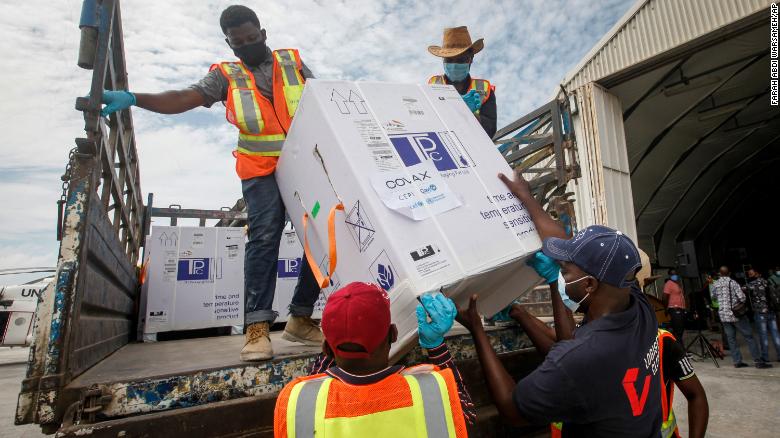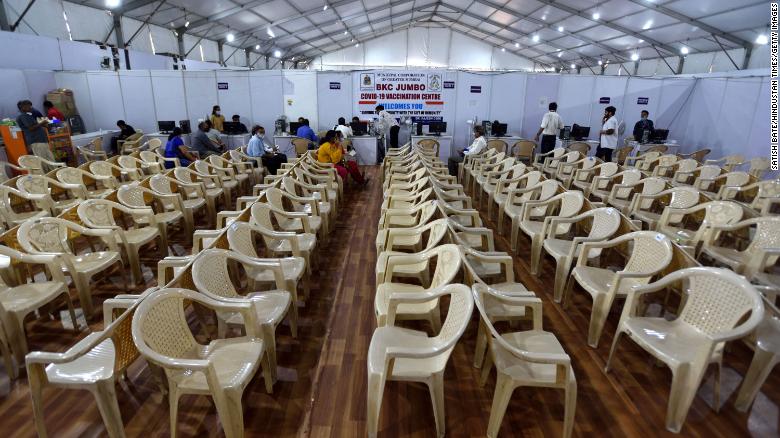In India, the world’s biggest vaccine producer, millions of people are waiting for Covid-19 vaccines amid a devastating second wave of infections.India typically produces more than 60% of all vaccines sold globally, and is home to the Serum Institute of India (SII), the world’s largest vaccine maker. Its vast manufacturing capability is why the country signed on as a major player in COVAX, the global vaccine-sharing initiative that provides discounted or free doses for lower-income countries. Under the initial agreement announced last year, SII would manufacture up to 200 million doses for up to 92 countries.But the situation in India is markedly different from just a few months ago. Its second wave began in March, quickly surpassing the first, which had peaked last September at more than 97,000 coronavirus cases a day.
On Sunday, the country reported 261,500 new cases — its highest single-day figure so far, according to data from the Indian Ministry of Health. India added a million new cases in less than a week, surpassing 14 million total cases on Thursday.States and cities are imposing new restrictions, including weekend and nighttime curfews in the capital region Delhi, home to 19 million people. Migrant workers are also leaving major cities en masse for their home villages, afraid any potential lockdowns will leave them stranded.And through it all, vaccine supplies have dried up on the ground, with at least five states reporting severe shortages and urging the federal government to act.In the face of crisis, the government and SII have shifted focus from supplying vaccines to COVAX to prioritizing their own citizens at home.”Deliveries of doses from the Serum Institute of India will be delayed in March and April,” said COVAX, which is run by a coalition including international vaccine organization Gavi and the World Health Organization, in a news release on March 25. “Delays in securing supplies of SII-produced Covid-19 vaccine doses are due to the increased demand for Covid-19 vaccines in India.” Boxes of the AstraZeneca vaccine, manufactured by the Serum Institute of India and provided through the COVAX global initiative, arrive in Mogadishu, Somalia on March 15.India had provided 28 million doses of the AstraZeneca vaccine so far, and was scheduled to deliver another 40 million doses in March and 50 million in April, the release said, adding that COVAX and the Indian government “remain in discussions” about completing supplies.It’s not the first time India had to pause its COVAX contributions: in January, the government restricted the export of AstraZeneca vaccines produced by SII “because they want to prioritize for the most vulnerable and needy segments first,” SII CEO Adar Poonawalla.But these repeated delays have hit poor countries hard. The director of Africa’s disease control body warned India’s hold on exports could be “catastrophic” for the continent — while Pakistan, one of the biggest program recipients, decided to allow private vaccine imports and sales to fill the gap.
Boxes of the AstraZeneca vaccine, manufactured by the Serum Institute of India and provided through the COVAX global initiative, arrive in Mogadishu, Somalia on March 15.India had provided 28 million doses of the AstraZeneca vaccine so far, and was scheduled to deliver another 40 million doses in March and 50 million in April, the release said, adding that COVAX and the Indian government “remain in discussions” about completing supplies.It’s not the first time India had to pause its COVAX contributions: in January, the government restricted the export of AstraZeneca vaccines produced by SII “because they want to prioritize for the most vulnerable and needy segments first,” SII CEO Adar Poonawalla.But these repeated delays have hit poor countries hard. The director of Africa’s disease control body warned India’s hold on exports could be “catastrophic” for the continent — while Pakistan, one of the biggest program recipients, decided to allow private vaccine imports and sales to fill the gap.
Vaccination centers turning people away
India is administering two vaccines domestically: the Oxford-AstraZeneca one, also known as Covishield, and its homegrown Covaxin, developed jointly by Bharat Biotech and the government-run Indian Council of Medical Research (ICMR)The country started its vaccination program in January for health care workers and priority groups, with the goal of fully inoculating 300 million people by August. But the program had a sluggish start, facing logistical issues as well as vaccine hesitancy among the population — especially towards Covaxin, which was approved for emergency use before the efficacy data of its third phase trial were released.To date, only 14.3 million people have been fully vaccinated — just over 1% of India’s population of 1.3 billion, according to Johns Hopkins University.But public confidence rose as the government stepped up an awareness campaign to assuage concerns, and the vaccination program picked up speed. As new daily cases accelerated in March and April, several states began reporting major vaccine shortages. A vaccination center in Mumbai, India, that had to turn people away due to a shortage of vaccines on April 9.
A vaccination center in Mumbai, India, that had to turn people away due to a shortage of vaccines on April 9.

